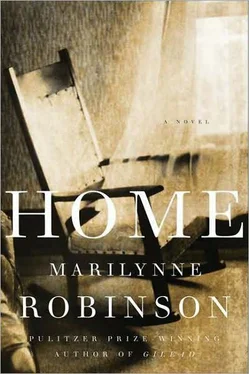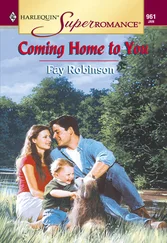“Then if she’s a kind woman she’ll probably forgive you. Of course I don’t know what you did, what she’d have to forgive you for.”
He laughed and tossed away his cigarette. “I’m not sure I do, either. There were so many things she put up with — it’s what I am, as much as anything. What I’m not. She got tired of the problems. I should have been more protective somehow.” He said, “I tried that. Once I sort of defended her honor. Not wise in the circumstances.” Then, “It probably wouldn’t matter if she did forgive me. I thought she might write, though.” He said, “You get used to kindness. After a while you begin to count on it. You miss it when it’s gone.”
She said, “I know a little bit about that,” and he nodded, and the lilacs rustled, and the sun shone, and there was quiet between them, a calm that came with being of one mind. So she had to say, “You shouldn’t lose hope.”
He laughed. “Sometimes I really wish I could.”
She said, “I know about that, too.”
Why hadn’t she bought clothes for him weeks ago? Because he was a stranger she was afraid of offending with so personal an attention. Because her buying clothes for him would allude to his poverty and offend him. Because it might seem like a subject of conversation for people who saw her buying them and this would embarrass and offend him. Because he was vain, and particular, and Jack. Cheap, sturdy work clothes were not the kind of thing he thought he should wear, and they would offend him. But in fact she saw him check the shirts on the line several times, and when one of them was dry enough, he brought it in and ironed it and put it on. The pants were heavier and took longer to dry. She saw him check them, too, then walk over by the orchard, pick a fallen apple off the ground, throw it up on the barn roof, and wait and catch it when it came down, and throw it again. Her brothers all did that when they were boys. Jack looked a little stiff, as if he were making an experiment in attempting this lonely game after so many years. Tentative as he was, it might have meant happiness.
AMES STROLLED OVER THAT EVENING AFTER SUPPER, FOR a game of checkers, he said, but he and their father sat in the porch with the board between them and talked quietly together, the way they did when advice of some kind was being sought and given. Glory brought them ice water and left them to themselves. It was a courtesy Ames paid to his friend to seek out pastoral wisdom even though he must have had wisdom of his own to spare after so many years, and since he was, by temperament, the more obliging of the two and therefore seldom in particular need of wisdom, his own or Boughton’s. All the same, he would offer up some soul to her father’s contemplation and then they would consider together, as they did in the old days, how to mollify, comfort, instruct. Boughton had resigned his pulpit ten years earlier, under circumstances that made Ames especially careful to respect his views. The Sunday-school children were marrying, and the married couples had settled into difficult, ordinary life, and the grave old men and women who had taught the Sunday-school children about bands of angels and flying chariots were themselves crossing over Jordan one by one. So he helped Ames think through whatever question might have arisen among the Congregationalists, whom he knew better than his own former flock now, through these murmured consultations. “Yes,” he would say, “a good deal of tact will be called for in dealing with that fellow,” and Ames would say, “That’s for sure.” During these conversations her father’s expression assumed its old sagacity, that gentle shrewdness of the practiced shepherd of souls. “But I’d tell him where matters stand. I’d be frank about it.” His eyes would kindle with the thought of firmness and candor, the memory of those old pleasures. Ames always watched him with a kind of bemused and wistful respect, as if he were now the younger man and his friend had aged past him into a venerability he might never attain. “Yes,” he would say, “I will certainly be frank.”
Jack came upon them there, talking together. She heard them greet him, and a word or two, and then he came into the kitchen with cucumbers from the garden. His shirt bloused and his pants gathered a little under his belt, but she was pleased all in all with the way he looked and she could tell he was, too. He managed to seem a little dapper, somehow, a thing his pride required. She knew this was a relief to him. He washed the cucumbers. “Cucumbers smell like evening,” he said. “Like chill. Need any help?” When she said no he went to the piano and sat down and began to play “Softly and Tenderly,” a favorite hymn of his father’s. He played it softly, and, she thought, very tenderly. She went into the hallway to listen, and he glanced up at her sidelong, as if there were an understanding between them, but he played on pensively, without a hint of detachment or calculation. “Come home, come home, ye who are weary, come home.” The old men fell silent. “Earnestly, tenderly, Jesus is calling, calling for you and for me.” Her father sang, Ames with him. Then “Rock of Ages,” then “The Old Rugged Cross,” and when that song was over, it was night. It had begun to thunder and rain, one of those storms that come after dark and change the weather. The old men sat there, silent for a long time. She brought Ames an umbrella, and after a while she heard him take his leave. She was afraid the damp might make her father uncomfortable, but he asked her, very kindly, to leave him alone for a little while. He said, “Tell Jack that was wonderful. I was proud of him.”
She found Jack in his room, the door open, lying on his bed reading a book. She said, from the doorway, “Jack, Papa told me to tell you it was wonderful that you played for them. He said he was proud of you.”
He considered. “Was Ames still here when he said that?”
“Not when he said it to me. Ames would have known it anyway.”
Jack nodded. “I suppose he would. Good. Thanks, Glory.”
IT RAINED SOUNDLY AND SATISFACTORILY OVERNIGHT. There was talk of drought, and one good rain would not end the worry, but it did make a beautiful morning, a mild and fragrant wind and shimmering trees loud with birds. Jack had left the house early. Glory heard the creak of the screen door before the sun was well up. His restlessness took on the aspect of virtue, rousing him out of bed in the dark and sending him out into the garden to expend the sour energies of failed sleep. She went down to the kitchen and started a pot of coffee, and sat in the porch while it brought itself to the kind and degree of fragrance her family had always preferred. Then she poured a cup for Jack. She found him out by the clothesline. He pulled a line down and released it, and raindrops flew up, brilliant in the morning light. He did the same with the next one, and the next.
“Thanks,” he said, as he took the cup from her. She saw that he had brought the gasoline can out of the barn. He said, “Back in a minute,” and went into the house, and came out again with his suit on hangers and a dishtowel over his shoulder. “I’m going to do a little dry cleaning.” He poured gasoline into an empty coffee can and soaked the cloth in it, and then sponged the sleeve of his jacket, saturated the bulge at the elbow and the creases at the inside of the elbow, and pulled it straight. He glanced at her. “This sort of works,” he said. “After a while the smell goes away. Here,” he said, and handed her his cigarettes and his matches. “I can be absentminded.”
She said, “I’ve heard that people did this. I’ve never actually seen anyone do it before.”
He said, “Sheltered life.”
The whole of that morning he worked at his suit. She saw him stand back finally and study it as it swung there in the wind and apparently decide it was good enough, since he emptied the coffee can out on the ground and carried the gasoline back to the barn. She went out to see for herself, and it did look to her as if it had fewer of the signs of hard use than it had had before, that it looked more impersonal, less conformed to one particular life. In the breeze there was something game about it, even a little jaunty. No wonder he was pleased.
Читать дальше












